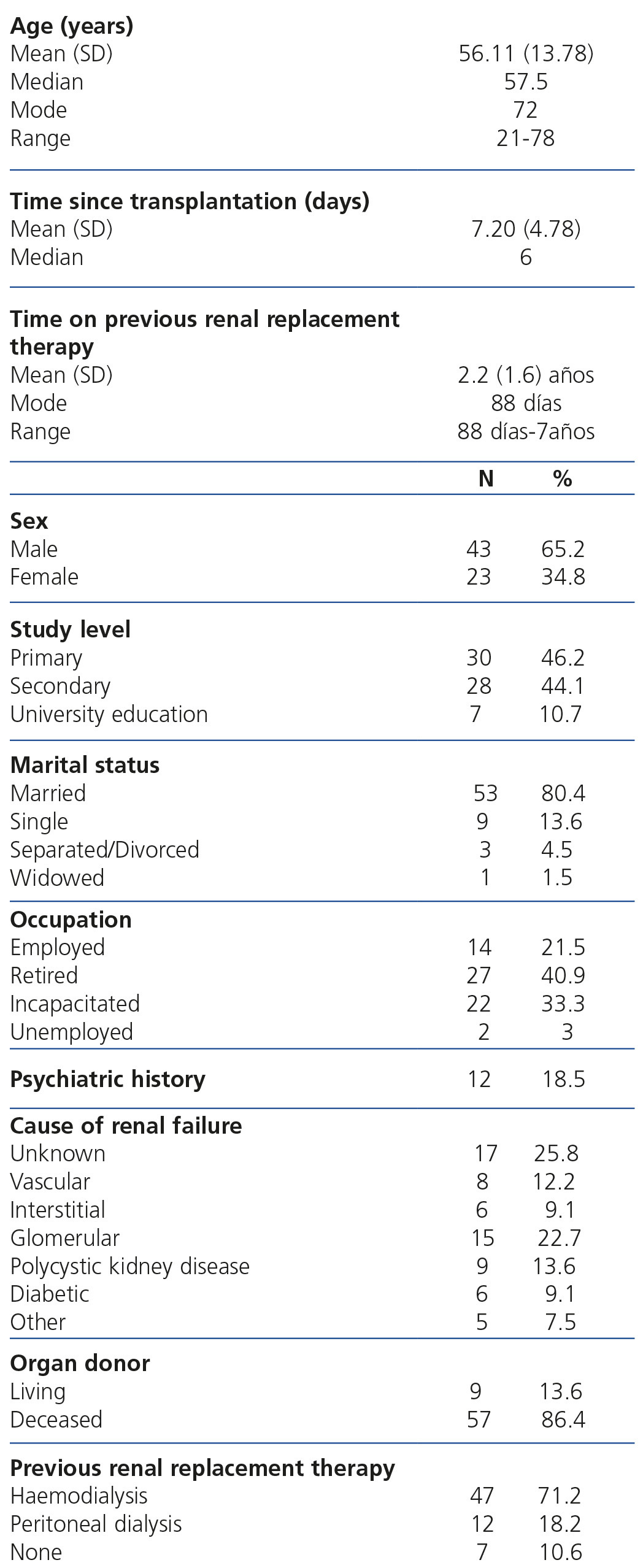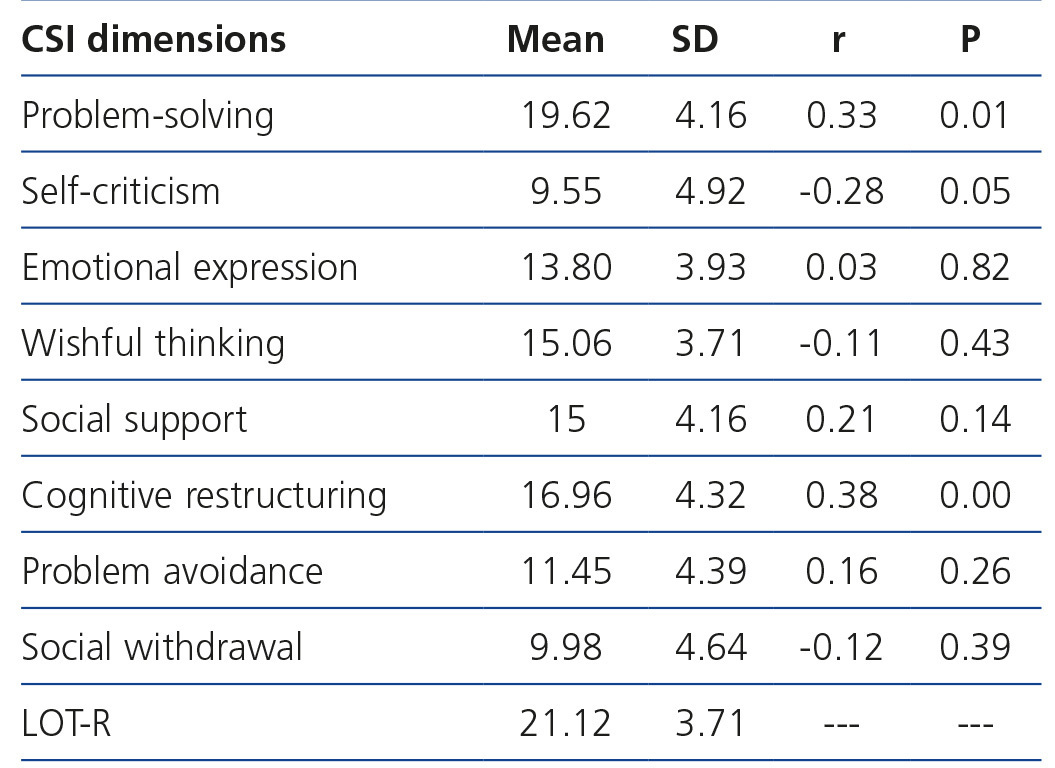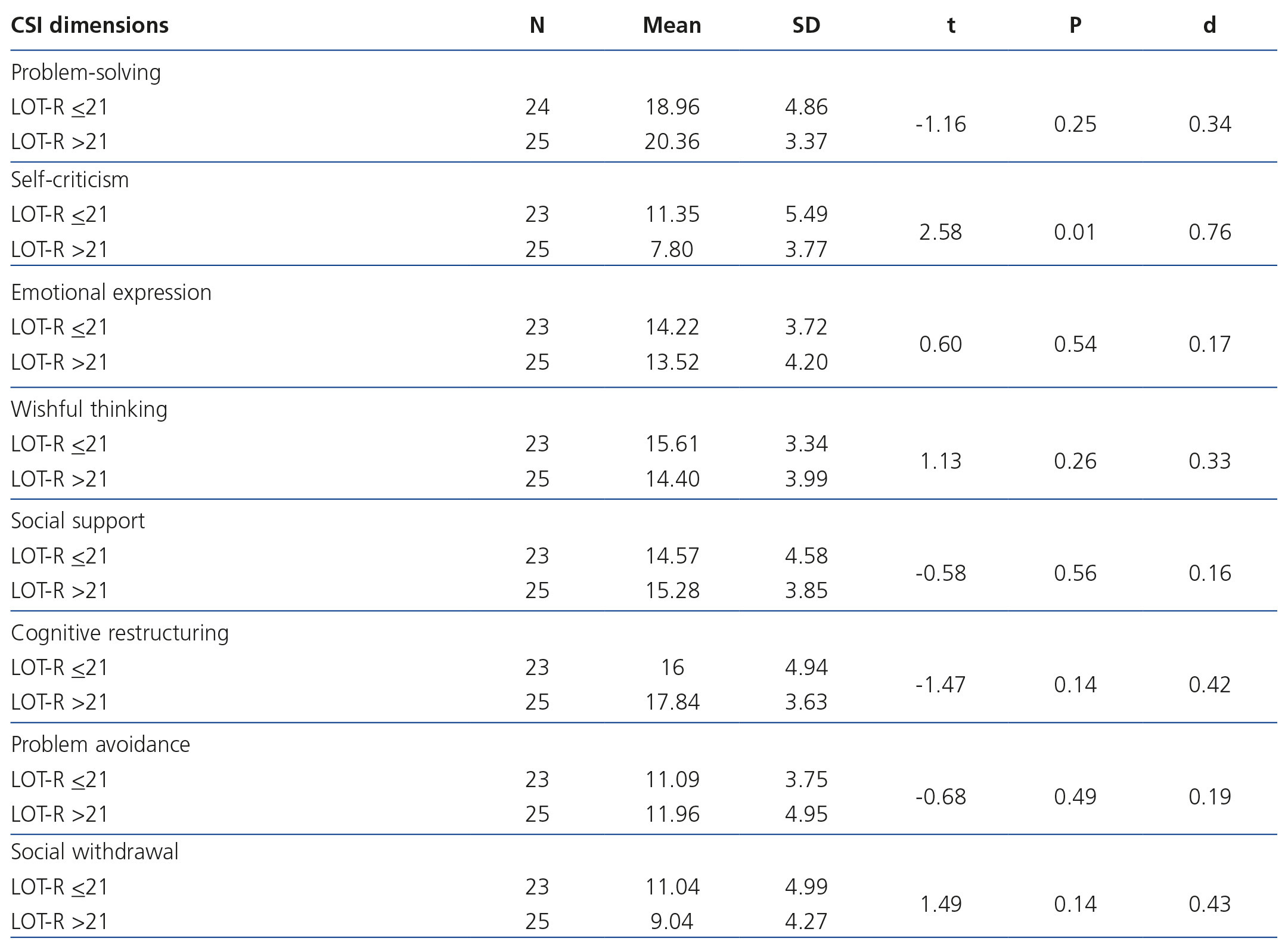Introducción: El optimismo disposicional aparece como un recurso personal que determina el estilo de afrontamiento y respuesta adaptativa ante enfermedades crónicas. Los objetivos de este estudio fueron averiguar las relaciones entre el constructo de optimismo disposicional y las estrategias de afrontamiento en pacientes con trasplante renal reciente, y evaluar diferencias en la utilización de estrategias de afrontamiento según el grado de optimismo disposicional. Material y métodos: Consecutivamente se eligen pacientes hospitalizados en el servicio de nefrología tras realizar el trasplante renal. Los instrumentos de evaluación fueron el Life Orientation Test-Revised y el Inventario de Estrategias de Afrontamiento. Los datos son analizados con medidas de tendencia central, análisis correlacional y comparación de medias con la prueba t de Student. Resultados: Participan 66 pacientes con trasplante renal. El estilo de afrontamiento que caracteriza a pacientes con trasplante renal reciente sería la Retirada social y la Evitación de problemas. Las correlaciones entre optimismo disposicional y estrategias de afrontamiento son significativas, en sentido positivo en Resolución de problemas (p < 0,05) y Reestructuración cognitiva (p < 0,01), y en sentido inverso con Autocrítica (p < 0,05). Las diferencias en optimismo disposicional generan diferencias significativas en la dimensión de Autocrítica (t = 2,58; p < 0,01). Conclusiones: Las puntuaciones en optimismo disposicional aportan diferencias en la respuesta de afrontamiento tras el trasplante renal. Además, las estrategias de afrontamiento podrían estar influyendo en la percepción del paciente sobre el bienestar emocional tras el trasplante renal.
Introduction: Dispositional optimism is a personal resource that determines the coping style and adaptive response to chronic diseases. The aim of this study was to assess the correlations between dispositional optimism and coping strategies in patients with recent kidney transplantation and evaluate the differences in the use of coping strategies in accordance with the level of dispositional optimism. Material and method: Patients who were hospitalised in the nephrology department were selected consecutively after kidney transplantation was performed. The evaluation instruments were the Life Orientation Test-Revised, and the Coping Strategies Inventory. The data were analysed with central tendency measures, correlation analyses and means were compared using Student’s t-test. Results: 66 patients with a kidney transplant participated in the study. The coping styles that characterised patients with a recent kidney transplantation were Social withdrawal and Problem avoidance. Correlations between dispositional optimism and coping strategies were significant in a positive direction in Problem-solving (p<.05) and Cognitive restructuring (p<.01), and inversely with Self-criticism (p<.05). Differences in dispositional optimism created significant differences in the Self-Criticism dimension (t=2.58; p<.01). Conclusions: Dispositional optimism scores provide differences in coping responses after kidney transplantation. Moreover, coping strategies may influence the patient’s perception of emotional wellbeing after kidney transplantation.
INTRODUCTION
The transplantation process may be considered a repetitive stressor that is a challenge to the psychological wellbeing of the patient, who is exposed to continual demands in the healthcare context1. Cognitive models of stress have defined coping as the constantly changing cognitive and behavioural efforts that are developed to manage specific demands of the environment and are evaluated as exceeding or surpassing the individual’s resources2. In this regard, coping strategies would be the processes that are used in each specific context and which may change depending on the triggering conditions; furthermore, they may be considered adaptive insofar as they reduce stress or promote long-term health3. In chronic renal failure patients, the type of coping strategy used helps to predict the quality of life indexes related to health and adherence to treatment5.
Continuing at a conceptual level, there is a line of research on the influence of characteristics of personality on the coping process6. These dispositional aspects in patients with kidney transplants are displayed as determining factors of emotional distress and of the perception of health-related quality of life7. Dispositional optimism has been included amongst the personal resources that promote health behaviour and physical wellbeing, along with social support, self-esteem and self-efficacy1,4,7,8. Although the mechanism whereby some personal resources contribute to the promotion of health is not clear, they do seem to increase resistance to adversity7.
Dispositional optimism is described as a generalised expectation or belief that positive events will take place in the future9. Optimism is considered to be a protective factor against health problems; at a personal level, an optimistic profile is associated with lower vulnerability in the perception of physical distress8, a lower long-term manifestation of anxious-depressive symptoms10,11 and a higher general health index perceived in patients with chronic renal failure on treatment with haemodialysis4. Dispositional optimism also appears to be related to higher levels of life satisfaction among chronic renal failure patients12. With regard to coping strategies, high scores in dispositional optimism are related to adaptive responses that facilitate the acceptance of the disease’s chronic nature9,11. Against the disease, dispositional optimism predisposes the use of active coping strategies such as “fighting spirit” compared with “despair”, which characterises individuals with low dispositional optimism10. Some recent studies in the area of health associated dispositional optimism with a lower risk of suffering an episode of heart failure in a four-year follow-up13; furthermore, in patients with psoriasis, a high dispositional optimism is related to a perception of a better quality of life14, and fewer anxious-depressive symptoms or lower functional impairment in patients with chronic pain15.
Along this same line, the objectives of this study were to discover the relationships between the construct of dispositional optimism and coping strategies in patients with a recent kidney transplant, as well as determining whether there are differences in the use of coping strategies in accordance with the degree of dispositional optimism.
MATERIAL AND METHOD
This was a simple cross-sectional, observational retrospective study, carried out on kidney transplant patients. The data were collected between February and November 2012. The research method used was approved by the hospital’s ethics committee.
We consecutively selected a sample of patients admitted to the nephrology department after performing a kidney transplant. We explained the study objectives to all patients, those who participated signed the consent form and after recording the socio-demographic data, we evaluated their Life Orientation Test-Revised (LOT-R). The medical data were obtained from the patients’ clinical history. One month after transplantation, during a medical visit, they were evaluated using the Coping Strategies Inventory (CSI).
Exclusion criteria were as follows: patients older than 18 years of age with a recent kidney transplantation, performed less than one month before, who gave their informed consent to participate in the study. Exclusion criteria were: cognitive impairment, which could prevent comprehension of the tests administered or physical problems, which could make it difficult to complete the questionnaires.
During hospitalisation after kidney transplantation, we offered 67 patients the chance to participate in the study; of these, one patient declined to participate due to a lack of interest. Of the 66 who completed the first questionnaire, LOT-R, whose socio-demographic and clinical data were recorded, 50 patients (83.34%) completed the second part of the evaluation one month after transplantation. The reasons for not carrying out the second evaluation were: lack of interest in the study in 9 patients, 4 had physical problems that prevented them from carrying out the test, 2 had language difficulties and therefore did not understand the questionnaires, and 1 patient died.
From the data collected, we considered the following as patient socio-demographic variables: age, sex, marital status, level of education and occupation. As clinical variables, we recorded psychiatric history, time since transplantation and type of donor.
LOT-R16 is an instrument used to assess dispositional optimism, which refers to the stable belief or predisposition of having a generalised view of positive results in the future. The Spanish adaptation is composed of 10 items with a 5-point Likert scale from 1 (completely disagree) to 5 (completely agree). The greater the score obtained in the LOT-R, the higher the degree of dispositional optimism. The reliability index displays acceptable values (α=0.78)17.
The CSI18, as its name indicates, evaluates the coping strategies and the degree of efficacy perceived in coping. The adaptation to Spanish contains 40 items grouped into 8 factors: Problem-solving (α=0.86), Self-criticism (α=0.89), Emotional expression (α=0.84), Wishful thinking (α=0.78). Social support (α=0.80), Cognitive restructuring (α=0.80), Problem avoidance (α=0.63) and Social withdrawal (α=0.65)19. The responses evaluate how frequently there was an occurrence of what each item expressed in the renal transplantation process, scored on a 5-point Likert scale, which were defined from 0 (not at all) to 4 (completely).
In the statistical tests, we performed a descriptive analysis of the data, calculating the distribution of frequency and measures of central tendency. Normal distribution was tested using the Kolmogorov-Smirnov test. We used the Pearson correlation to find associations between data. The comparison between groups was carried out with Student’s t-test using the median of the LOT-R score distribution in the study sample, in the absence of a validated cut-off point. As complementary data to statistical significance, Cohen’s d was used to quantify the size of the effect between the means in coping strategies, according to the high or low dispositional optimism score. All statistical analyses were performed using SPSS software version 12.
RESULTS
The patients included in the study had a mean age of 56 years (standard deviation: 13.78), with a slightly higher proportion of males (65.2%) and the majority were married (80.3%). The mean time since the first post-transplantation evaluation was 7 days and after one month the patients were scheduled for an evaluation with CSI. Around 20% of them had a history of psychiatric treatment. The most common cause of kidney failure was unknown (25.8%) or glomerular (22.7%). Before transplantation, most patients underwent renal replacement therapy with haemodialysis (71%). Deceased kidney donors were more prevalent (86.4%). Table 1 displays the socio-demographic and clinical characteristics of study participants.
Correlations between coping strategies and dispositional optimism
The scores in coping dimensions and LOT-R follow a normal distribution according to the Kolmogorov-Smirnov test. In kidney transplant patients, the mean scores in all coping strategies evaluated with CSI were higher than the population mean19. The Problem-solving, Self-criticism, Emotional expression, Social support and Cognitive restructuring strategies reach the 75th or a greater percentile, according to the Spanish population scale16, reaching the 90th percentile in the Problem avoidance and Social withdrawal dimensions. Wishful thinking had mean percentiles of 65%. The correlations between dispositional optimism and coping strategies were significant and positive in Problem-solving (p<.05) and Cognitive restructuring (p<.01). The association also reaches significant levels in the reverse direction with the Self-criticism dimension: the greater the dispositional optimism, the lower the Self-criticism (p<.05) (Table 2).
Differences in the use of coping strategies according to dispositional optimism scores
Since there was no cut-off point for significantly distinguishing dispositional optimism, we used the median of the distribution in the study sample (value of 21 in the LOT-R). On assessing the differences in coping strategies between the two groups that were high and low in dispositional optimism, there were only significant differences in the Self-criticism dimension (t=2.58; p<.01). The patients with higher dispositional optimism significantly showed a lower tendency for Self-criticism as a coping strategy during kidney transplantation (Table 3).
DISCUSSION
There are few studies on coping strategies used by patients who have received a kidney transplant. According to our results, in the evaluation carried out one month after transplantation, the coping responses characteristic of transplant patients were Social withdrawal and Problem avoidance, behaviour that may be understood as a self-protection against the perception of physical vulnerability, considering that they are patients who are still recovering from recent surgery. The Wishful thinking strategy, referring to cognitive strategies that reflect the desire for the transplantation process not to be stressful, had mean percentiles with respect to the general population, which shows how stressful it is for the patients to undergo a kidney transplantation.
In our study, the correlations between dispositional optimism and coping strategies aimed at Problem-solving and Cognitive restructuring are significant in a positive direction. According to this result, optimism would facilitate the generation of cognitive and behavioural responses aimed at reducing stress after transplantation, adaptively changing the perception of the stressful event. These results corroborate previous studies on the relationship between coping strategies and dispositional optimism: active coping strategies (planning, positive reinterpretation, personal growth and problem-solving), versus passive coping strategies (negation, distancing, emotion-centred), characterise individuals with high scores in dispositional optimism20. In patients with chronic pain, dispositional optimism is related to active coping strategies, which in turn are related to a lower level of perceived pain and anxious-depressive symptoms and better functioning of the patient15. Therefore, dispositional optimism is positively related to coping strategies that promote healthy habits21, bearing in mind that patients with renal failure must be capable of carrying out restrictive diets (low in potassium and phosphorus), eliminating alcohol and drug intake, adhering to pharmacological treatments and regularly attending medical appointments. In this regard, in haemodialysis patients, active coping strategies predict better health-related quality of life versus passive coping strategies4. Furthermore, in patients with chronic renal failure, using coping strategies aimed at solving problems predicts the decrease in emotional distress or anxious-depressive symptoms22. Some studies even identify dispositional optimism as the variable that determines a higher level of perceived general health4,15,23 or a lower intensity in physical distress symptoms8.
Dispositional optimism is a significantly predictive variable of psychological wellbeing after transplantation and it promotes adaptive coping strategies1. Therefore, the results of our study can also be understood in the sense that the patient group with high dispositional optimism scores had significant differences in the self-criticism or self-blame response versus the patient group with low optimism.
We should highlight some study limitations that must be borne in mind for future studies. Firstly, we should consider the type of design: in the future, it would be interesting to consider a longitudinal study that allows us to monitor changes in coping strategies shown by patients, which are associated with improved quality of life indexes during post-transplant evolution. Secondly, it would be appropriate to study the relationship between coping strategies and dispositional optimism mediated by other variables, such as socio-demographic characteristics (sex, age), or include as mediating variables other aspects assessed as influencing personal resistance to stress situations, such as self-efficacy or perceived social support.
In conclusion, dispositional optimism would be a personal resource that facilitates the use of certain coping strategies which promote an adaptive response to kidney transplantation and which may have an influence on the quality of life subsequently displayed by the patient.
Conflicts of interest
The authors declare that they have no conflicts of interest related to the contents of this article.
Table 1. Socio-demographic and clinical characteristics of kidney transplant patients (N = 66)
Table 2. Means, standard deviations and correlations between the dimensions of the Coping Strategies Inventory and the dispositional optimism scores (Life Orientation Test-Revised)
Table 3. Comparisons of means in the dimensions of coping strategies between patients with high and low dispositional optimism using the median as a differential point between both groups (score 21)











